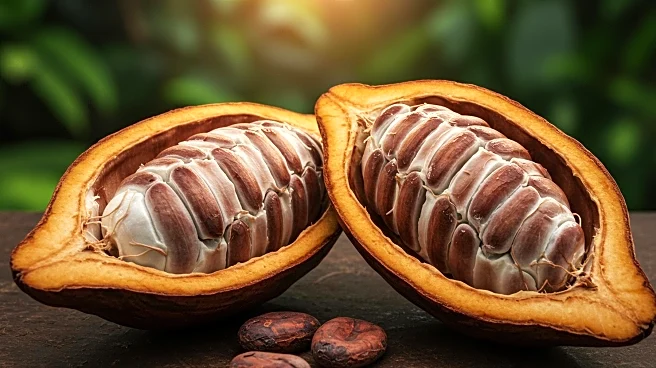What's Happening?
Researchers have discovered nine species of fungi and bacteria in cocoa beans that contribute to the development of fine chocolate flavors. These microbes, found during the fermentation process, produce fruity and caramel notes in chocolate. The study, conducted by David Salt and his team at the University of Nottingham, involved collecting samples from cocoa farms in Colombia and analyzing the genetic material to identify the microbes responsible for these flavors. The findings suggest that adding specific microbes to fermentation mixtures could improve the flavor profile of cocoa beans, potentially increasing the profitability for cocoa growers.
Why It's Important?
The discovery of specific microbes that enhance chocolate flavors could have significant implications for the chocolate industry. By improving the flavor profile of cocoa beans, producers can create higher-quality chocolate products, potentially leading to increased consumer demand and higher prices. This could benefit cocoa farmers by providing them with a method to increase the value of their crops. Additionally, the ability to manipulate chocolate flavors through microbial fermentation could lead to the development of new and unique chocolate varieties, expanding the market and offering consumers more choices.
What's Next?
Further research is needed to determine if the set of microbes identified in Colombia can be applied to cocoa farms in other regions, where different environmental factors may affect microbial growth. Researchers may explore practical methods for cocoa growers to influence their fermentation microbiomes, potentially leading to widespread adoption of these techniques. The study also opens the possibility of using lab-grown cocoa with selected microbial mixtures to produce novel chocolate flavors, which could revolutionize the industry.
Beyond the Headlines
The study highlights the complex interplay between agriculture and microbiology, emphasizing the importance of understanding microbial ecosystems in food production. This research could inspire similar studies in other agricultural sectors, where microbial fermentation plays a crucial role in flavor development. The ethical implications of manipulating natural fermentation processes should be considered, as well as the potential impact on traditional chocolate-making practices.











